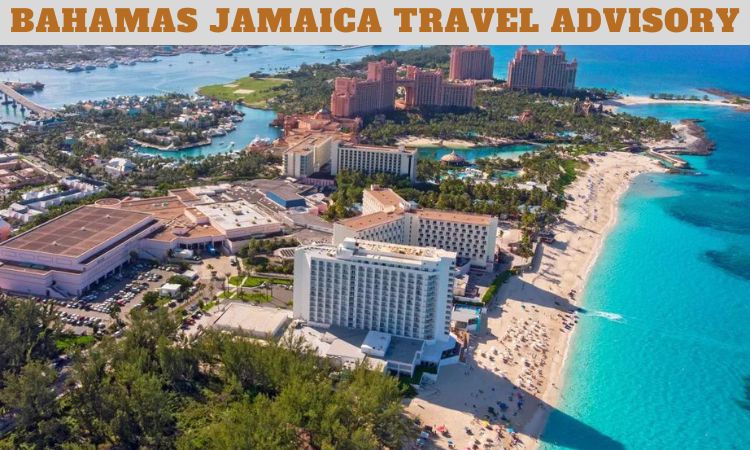
The Bahamas and Jamaica, two Caribbean gems known for their pristine beaches, turquoise waters, and vibrant cultures, remain popular tourist destinations. However, recent travel advisories issued by the U.S. Department of State highlight potential safety concerns, prompting travelers to exercise caution and make informed decisions. This advisory aims to provide a comprehensive overview of the current travel advisories for both countries, highlighting key risks and safety tips.
Bahamas Travel Advisory: Level 2 - Exercise Increased Caution
The Bahamas currently holds a Level 2 travel advisory, urging travelers to exercise increased caution due to crime. While the overall risk is lower compared to Jamaica, the advisory emphasizes the following:
- Violent Crime: While not as widespread as in Jamaica, violent crimes like armed robberies, assaults, and homicides occur in the Bahamas, particularly in areas frequented by locals.
- Petty Theft: Tourists are advised to be vigilant against pickpocketing and bag snatching, especially in crowded areas.
- Sexual Assault: Although less frequent than in Jamaica, sexual assault incidents have been reported, including at all-inclusive resorts.
Jamaica Travel Advisory: Level 3 - Reconsider Travel
Jamaica carries a Level 3 travel advisory, urging travelers to reconsider their travel plans due to a higher prevalence of crime. The U.S. Department of State highlights the following concerns:
- Violent Crime: Violent crimes, including armed robberies, home invasions, sexual assaults, and homicides, are a significant concern in Jamaica. These incidents can occur in tourist areas, including all-inclusive resorts.
- Limited Police Response: Local law enforcement may not always respond effectively to serious crimes, and investigations often lack follow-up, leading to a low prosecution rate.
- Gang Activity: Gang violence is a major issue in Jamaica, particularly in certain areas. Travelers are advised to avoid these areas and exercise caution in unfamiliar neighborhoods.
Safety Tips for Both Countries
Despite the advisories, responsible travelers can still enjoy these beautiful destinations by following these safety tips:
- Stay Informed: Remain updated on the latest travel advisories and local news before and during your trip.
- Choose Safe Locations: Opt for well-lit, populated areas, especially at night. Avoid secluded beaches, deserted streets, and unfamiliar neighborhoods.
- Be Vigilant: Maintain situational awareness, keep valuables out of sight, and avoid carrying large sums of cash.
- Travel with a Buddy: Whenever possible, explore with a companion, especially at night.
- Trustworthy Transportation: Utilize reputable taxi services or pre-arranged transportation instead of public buses.
- Resort Security: Familiarize yourself with resort security protocols and report any suspicious activity.
- Limited Nightlife: Avoid venturing out alone at night, particularly in areas with a reputation for crime.
- Cultural Sensitivity: Dress modestly in certain areas and respect local customs and traditions.
Additional Considerations
- Medical Services: Both countries have limited medical facilities, particularly in rural areas. Ensure you have adequate travel insurance and carry any necessary medications.
- Natural Disasters: The Caribbean region is prone to hurricanes and other natural disasters. Monitor weather forecasts and follow local evacuation instructions if necessary.
- Specific Concerns: Research the specific risks associated with your chosen destinations within each country. Certain areas might have higher crime rates than others.
Conclusion
While the Bahamas and Jamaica face security challenges, responsible travelers can still enjoy these destinations by exercising caution, following safety guidelines, and staying informed. By understanding the current travel advisories and implementing these tips, you can minimize risks and maximize your Caribbean vacation experience.
Remember
- The travel advisory levels can change, so always check the latest updates from the U.S. Department of State before your trip.
- Travel advisories are not absolute bans, but rather a tool to help you make informed decisions about your travel plans.
- By taking necessary precautions and remaining vigilant, you can minimize risks and have a safe and enjoyable trip to the Bahamas or Jamaica.
Bahamas & Jamaica Travel Advisory FAQs
1. What is the current travel advisory level for the Bahamas and Jamaica?
- The Bahamas: Level 2 – Exercise Increased Caution
- Jamaica: Level 3 – Reconsider Travel
2. Why are the advisory levels different for each country?
Ans. The US State Department considers Jamaica to have a higher risk of crime, particularly violent crime, compared to the Bahamas.
3. What are the main safety concerns mentioned in the advisories?
- Jamaica: Violent crime, including homicides and sexual assaults, which can occur even at all-inclusive resorts.
- Bahamas: Crime, including petty theft and armed robbery, and potential safety issues with recreational boating activities.
4. Should I completely avoid traveling to these countries?
Ans. The advisories are meant to raise awareness of potential risks, not necessarily to ban travel entirely. Ultimately, the decision to travel is yours.
5. What are some safety precautions recommended for both countries?
- Stay in well-lit, populated areas, especially at night.
- Be aware of your surroundings and belongings.
- Avoid isolated areas and public transportation (Jamaica).
- Choose licensed and reputable transportation services.
- Exercise caution when participating in water activities (Bahamas).
6. Is it safe to stay at all-inclusive resorts in Jamaica?
Ans. While the advisories mention potential risks at resorts, many travelers enjoy safe and enjoyable vacations there. Research the resort’s security measures and exercise common sense.
7. Do I need to take any special precautions regarding COVID-19?
Ans. Check the current entry requirements and restrictions for both countries regarding COVID-19 vaccinations, testing, and protocols.
8. Where can I find the latest travel advisories for these countries?
Ans. The US Department of State website: https://travel.state.gov/content/travel/en/traveladvisories/traveladvisories.html/
9. Is it helpful to enroll in the Smart Traveler Enrollment Program (STEP)?
Ans. Yes, enrolling in STEP allows the US government to contact you in case of emergencies and provides updates relevant to your destination.
10. Should I consider travel insurance?
Ans. Travel insurance is always a good idea, especially when visiting destinations with elevated risks mentioned in travel advisories.
Sources


